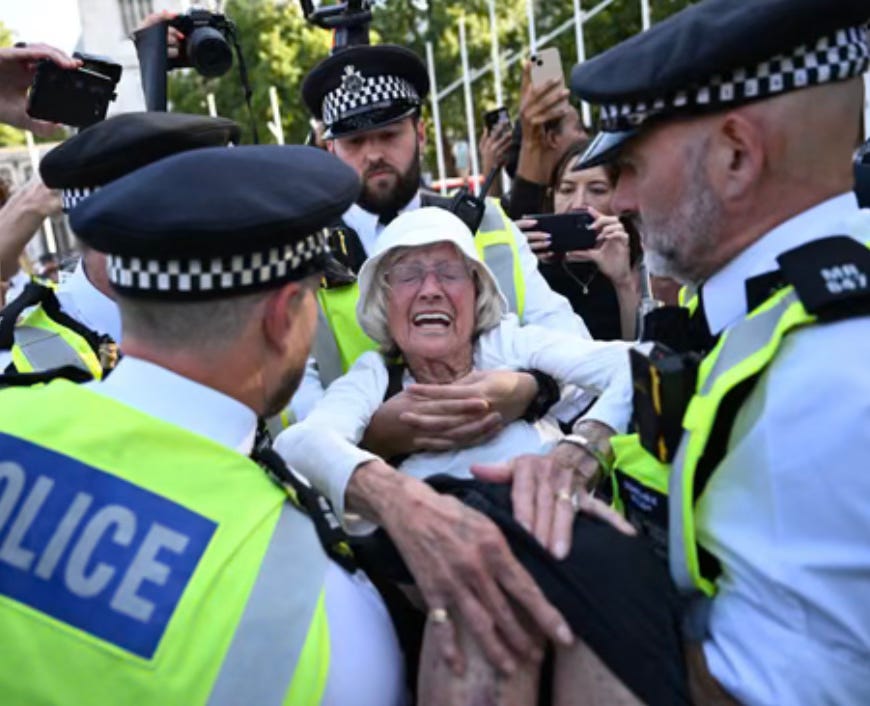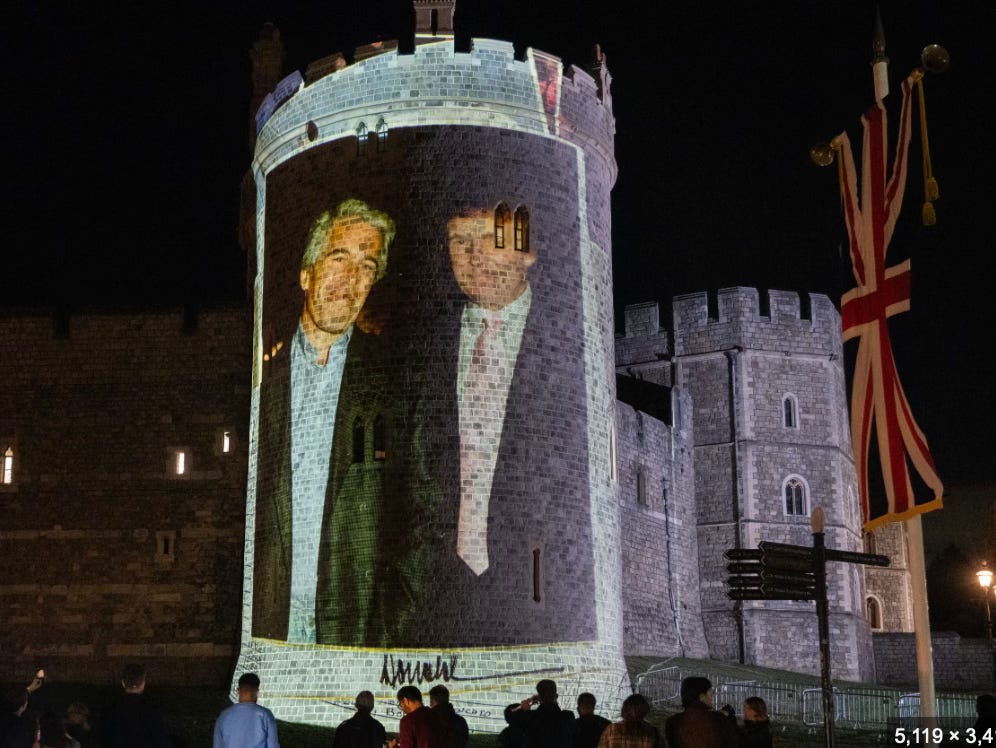Led By Donkeys vs Elon Musk: Arrests, Free Speech, and the Labour Government’s Double Standard
On Tuesday night, the walls of Windsor Castle became a canvas. A giant film projection of Donald Trump with Jeffrey Epstein, timed just before the US President’s state visit, lit up the royal residence. The action was claimed by the protest group Led By Donkeys, known for its satirical interventions in British public life. Within hours, four people had been arrested, accused of committing “malicious communication” (The Guardian, 2025a). The film’s content contained information that is already in the public domain and has been widely shared – including on major television networks.
The scene could not have been more different a few days earlier, when Elon Musk was beamed in on a large stage screen in London, telling the crowd that Britain must “fight back or die,” and calling for the dissolution of Parliament (Plague Island, 2025; The Guardian, 2025b). Musk was not arrested. Legal experts noted that, while his rhetoric was inflammatory, it likely fell just short of the statutory thresholds for incitement (The Guardian, 2025b). But that gap reveals a troubling inconsistency: satire projected in light is treated as a crime, while violent political rhetoric by the world’s richest man passes without sanction.
The Double Standard
What we are left with is a striking asymmetry. Led By Donkeys stage a projection: a video installation with a clear satirical edge, and they are rounded up under the banner of “malicious communication” (The Guardian, 2025a). Yet Musk, who literally urged his audience to embrace the prospect of violence and the end of Parliament, is treated as if he were merely playing with metaphors (The Guardian, 2025b).
This is becoming a pattern. Time and again, this Labour government has shown that it dislikes being confronted with uncomfortable truths. A satirical protest that connects Trump to Epstein is inconvenient, embarrassing, politically damaging. Musk’s rhetoric, however unhinged, is harder for them to categorise, and perhaps harder to challenge given the scale of his influence and wealth (Plague Island, 2025).
It raises a simple, but dangerous question: are the laws designed to protect citizens from harm now being applied instead to protect authority from scrutiny? When satire is criminalised and violent rhetoric is excused, the dividing line between justice and censorship becomes worryingly blurred.
Musk’s Free Pass
Musk’s defenders will argue that his words were vague, that they did not cross the legal threshold of “incitement to violence” as defined under UK law. Legal experts quoted in the press suggested much the same: the comments were dangerous, yes, but probably not prosecutable (The Guardian, 2025b).
But that itself is revealing. Musk, the world’s richest man, can stand on a stage in Britain and tell people to “fight back or die;’ a phrase that in almost any other context would raise red flags for counter-terror police, and walk away untouched. His wealth, his platform, and his power act as a shield.
It is hard to imagine a grassroots activist or community organiser being given the same benefit of the doubt. They would not be able to retreat behind the thin curtain of metaphor. They would be branded dangerous, disruptive, perhaps even seditious. The rules, it seems, are bent for those at the top, while those at the bottom are left to bear the brunt of enforcement.
Led By Donkeys as Scapegoat
Led By Donkeys’ projection was neither violent nor threatening. It was satire in its purest form: using widely circulated knowledge, symbolism, and timing to hold power to account. Yet it has been swiftly reframed as “malicious communication,” a phrase that makes a political intervention sound like a hate crime (The Guardian, 2025a).
What this really exposes is how fragile those in power have become. Musk can posture about revolt and dissolution, but the state looks away. A projection that embarrasses the incoming American president, however, is met with police vans and charges. The symbolism is hard to miss: mock authority, and you are a criminal; threaten democracy, and you are untouchable.
In this sense, Led By Donkeys have been made scapegoats. They are easier to punish than Musk. They are local, visible, and vulnerable, unlike a billionaire who can summon a team of lawyers with a single phone call. But punishing satire is not just heavy-handed; it is corrosive. It tells us that the government is more interested in protecting its image than in protecting the public or honouring the truth.
The Bigger Picture
What we are seeing here is not an isolated incident. It is part of a wider drift under Starmer’s Labour government: the narrowing of the space for dissent, the criminalisation of protest, the willingness to turn the machinery of the state against those who speak truths that power finds inconvenient.
Palestine Action know this only too well. Their disruptive but non-lethal tactics - paint, blockades, occupations - have already seen them branded as extremists, with the group proscribed under the Terrorism Act 2000 after activists vandalised aircraft at RAF Brize Norton (Al Jazeera, 2025). In the days that followed, more than 20 people were arrested in London simply for showing support for the organisation (Reuters, 2025). The message is clear: cross the state’s red lines, and you will not be treated as a campaigner but as an enemy.

Led By Donkeys’ fate may be less severe, but the pattern is familiar. Satirists become suspects, protesters become criminals, campaigners become extremists. Meanwhile, figures like Musk, whose rhetoric actively toys with the language of insurrection, are granted immunity under the guise of “free speech.”
And here lies the danger: this imbalance does not just silence the left. It feeds the right. Every time Starmer’s government clamps down on peaceful protest while ignoring violent rhetoric from figures like Musk, it hands the far right another rallying cry. It confirms their narrative of a petty authoritarian establishment that must be defied. In trying to suppress dissent, Labour may in fact be stoking the very forces that threaten democracy most.
Conclusion
Starmer’s Labour government has made a habit of silencing dissent, from proscribing Palestine Action to threatening journalists and campaigners with spurious legal charges. The arrests at Windsor Castle fit neatly into that pattern. They are not about public safety; they are about controlling the narrative, shielding those in power from ridicule, and sending a warning to anyone who dares to embarrass the state.
And the warning could yet escalate. If Palestine Action can be branded a terrorist organisation for splashing paint and blocking access roads, how far are we from Led By Donkeys being proscribed for projecting inconvenient truths onto walls of stone?
We only wish we were joking.
When satire is treated as extremism and extremism is excused as free speech, the hierarchy of who is protected and who is punished becomes unmistakable. It is not about justice. It is about power. And power, as always, seeks to protect itself.
If you value this kind of writing, please consider subscribing to Plague Island.
We don’t hide our work behind a paywall, because we want it to be read. But if you can support it, we’ll use that support to keep writing more, and writing better.
Paid subscribers receive early access, behind-the-scenes newsletters, and the chance to shape future essays.
We write with rigour, we cite everything, and we answer only to our readers.
Or support us with a one-off tip → Buy Me a Coffee
References
Al Jazeera (2025) ‘Palestine Action: What has the group done as it faces a ban?’ 4 July. Available at: https://www.aljazeera.com/news/2025/7/4/palestine-action-what-has-the-group-done-as-it-faces-a-ban [Accessed: 17 September 2025].
Plague Island (2025) ‘Elon Musk, Tommy Robinson and the State of Fascism in Britain.’ Available at: https://www.plagueisland.com/p/elon-musk-tommy-robinson-and-the [Accessed: 17 September 2025].
The Guardian (2025a) ‘Four arrested after image of Trump and Epstein projected onto Windsor Castle ahead of president’s visit,’17 September. Available at: https://www.theguardian.com/us-news/2025/sep/17/four-arrested-after-image-of-trump-and-epstein-projected-onto-windsor-castle-ahead-of-presidents-visit [Accessed: 17 September 2025].
The Guardian (2025b) ‘What did Elon Musk say at far-right UK rally and did his remarks break the law?’15 September. Available at: https://www.theguardian.com/politics/2025/sep/15/what-did-elon-musk-say-at-far-right-uk-rally-and-did-his-remarks-break-the-law [Accessed: 17 September 2025].
Reuters (2025) ‘UK police arrest over 20 supporters of now-banned Palestine Action group,’ 5 July. Available at: https://www.reuters.com/world/uk/uk-police-arrest-over-20-supporters-now-banned-palestine-action-group-2025-07-05 [Accessed: 17 September 2025].


